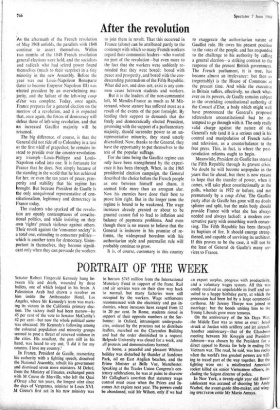PORTRAIT OF THE WEEK
Senator Robert Fitzgerald Kennedy hung be- tween life and death, wounded by three bullets, one of which lodged in his brain. A Palestinian Arab had drawn a revolver on him inside the Ambassador Hotel, Los Angeles, where Mr Kennedy's team was mark- ing its victory in the California primary elec- tion. The victory itself had been narrowâby 45 per cent of the vote to Senator McCarthy's 42 per centâbut now the whole political scene was obscured. Mr Kepnedy's following among the coloured population and minority groups seemed to pose a threat of renewed violence in the cities. His assailant, the gun still in his hand, was heard to cry out, 'I did it for my country. I love my country.'
In France, President de Gaulle, reasserting his authority with a fighting speech, dissolved the National Assembly, rebuilt his government and dismissed seven more ministers. M Debra, from the Ministry of Finance, exchanged posts with M Couve de Murville, who left the Quai d'Orsay after ten years, the longest stint since the days of Vergennes, minister to Louis XVI. M Couve's first act in his new ministry was to borrow $745 million from the International Monetary Fund in support of the franc. Rail and air services were on their slow way back to normal, but many factories were still occupied by the workers. Wage settlements recommenced with the electricity and gas in- dustries, where increases have ranged from 12 to 20 per cent. In Rome, students rioted in support of their opposite numbers at the Sor- bonne: in Oxford, intransigent undergradu- ates, ordered by the proctors not to distribute leaflets, marched on the Clarendon Building and had the order diminished to a request. Belgrade University was closed for a week, and all protests and demonstrations banned.
At home, a peaceful and pleasant Whitsun holiday was disturbed by thunder at Sandown Park, oil on East Anglian beaches, and the prime Minister at Belle Vue, Manchester. Speaking at the Trades Union Congress's cen- tenary celebrations, he was at pains to disavow Mr Callaghan's assertion that statutory wage control must cease when the Prices and In- comes Act expires next year. The powers could be abandoned, said Mr Wilson, only if we had an export surplus, progress with productivity, and a voluntary wages system. All this was coolly received as unpalatable in itself and un- suited to a happy birthday party, at which the procession had been led by a large ceremonial carthorse. Mr Jeremy Thorpe was joined in marriage: but the bonds uniting him to the Young Liberals grew more tenuous.
On the anniversary of the Six Days War, the Middle East was as tense as ever: Israel struck at Jordan with artillery and jet aircraft. Another anniversaryâthat of the Glassboro meeting between Mr Kosygin and President Johnsonâwas chosen by the President for a direct appeal to Russia for help in ending the Vietnam war. The road, he said, was less rocky when the world's two greatest powers are will- ing to travel part of the way together. But the fighting wore on: a misdirected American rocket killed six senior Vietnamese officers, in- cluding the Saigon director of police. In New York, a twenty-eight year old flower adolescent was accused of shooting Mr Andy Warhol, the avant-garde film-maker, and wing- ing SPECTATOR critic Mr Mario Amaya.






































 Previous page
Previous page